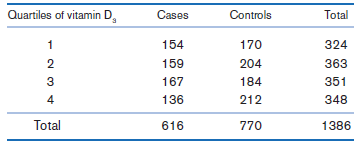What test can be performed to assess whether cases tend to have lower levels of vitamin D
Question:
Cancer
There were early reports that people with extensive sun exposure had a reduced risk of colorectal cancer incidence. Garland and Garland [26] hypothesized that vitamin D status accounted for this inverse association. To further study this hypothesis, a case-control study was performed relating blood levels of vitamin D to the occurrence of colorectal adenoma, a precursor to colorectal cancer (Fedirko et al. [27]). Data from two case-control studies were combined, one from Minnesota (the CPRU Study) and the other from the Carolinas (the MAP Study). All patients underwent elective colonoscopy, during which the presence of adenoma was determined. In addition, patients provided a blood sample and their 25 (OH) vitamin D3 levels were determined. Henceforth, we will refer to 25(OH) vitamin D3 levels as just vitamin D3. Since vitamin D3 varies by season of the year, all subjects were grouped into study-specific quartiles of blood vitamin D3 by month of blood draw. The following data were obtained:
Table 10.43: Association between blood levels of vitamin D and colorectal cancer

Step by Step Answer:






